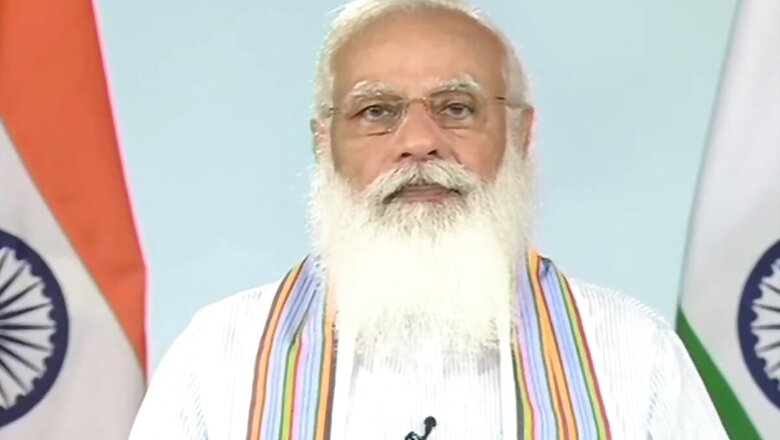
views
Prime Minister Narendra Modi has done a great job in addressing many social issues, making sure that 1.38 billion people get the basic necessities of life, like food on the table, water in the tap, power in their house, and education for children, access to medical care, and a bank account. Several big tax reforms have been initiated, the Insolvency and Bankruptcy Code has come into effect, the spending on infrastructure has increased, among other major economic policy decisions in the last seven years.
We are two years into the second five-year term and most of these two years were plagued by COVID. In the next three years before the 2024 elections, people want to enjoy the benefits of all the good policy decisions taken over the last seven years.
For Indians, jobs are the biggest priority. India produces nearly 1 crore graduates every year; most of them are looking for jobs, and if they do get jobs, these are usually not well-paying. So, for the next three years, the government’s big focus should be achieving high economic growth, lowering the barriers to growth and creating good-quality jobs so that quality of life and ease of living go up.
For that to happen, we need people in the government who have worked outside the government, are connected to the industry, can independently assess the effectiveness of policies in people’s lives, and can work to bridge the gap between people and policies.
It is time for the Prime Minister to widen the net of talent and try and get some good technocrats into some critical ministries so that there can be a greater push for growth and a greater push for better-quality jobs.
Critical Ministries Need Experts’ Advice
The first thing here is, identify the critical ministries.
The Ministry of Commerce and Industry, for example, should have a person from the industry helming it. The current minister is doing a great job but he is also handling other ministries; a ministry like industry requires undivided attention. Banking sector, for instance, requires someone like a K.V. Kamath or an Aditya Puri to spearhead it and advise the finance minister. Banking is stuck up in so many regulations that it is tough to run a bank today. A $3-trillion economy has bank lending at only 55 per cent of the GDP, one of the lowest among countries with similar GDP! A technocrat is certainly required here.
In the field of information technology, you require someone who has actually run technology companies to work with the government. Government needs to set technology standards, get government IT systems onto a common architecture, work with global organisations to set the next generation standards. The government needs a Chief Technology Officer for this. In the era of AI and machine learning, we urgently need to acquire the latest knowledge in order to frame next-generation data laws. China is spending $150 billion on AI but where does India stand?
Similarly, someone like a Manish Sabharwal as Minister of Labour and Employment would know exactly how jobs are created, what needs to be done to increase jobs in the formal sector, how to reduce compliances and the costs of formal jobs. He has the required expertise to assess which sectors have the potential to create jobs and suggest appropriate policy to accelerate job creation.
The Prime Minister can consider two options. He can get technocrats to work as ministers of state or at cabinet rank with independent charge in certain critical areas or he can have a group of industry people, may be 8-10, advising him on areas of their expertise. He can meet this group of technocrats once a month to further improve the ease of doing business and accelerate growth. But these experts need to be active, forward-looking people not old stalwarts.
Fixing the Feedback Loop
A government is of the people, by the people and for the people. Under ‘of the people’, we have elected representatives in Parliament; but under ‘by the people’, we have bureaucrats making policies—where are people involved in this? Yes, decisions are being taken ‘for the people’ but are they experiencing a positive impact of these decisions in their lives? In many areas yes, and in some areas no, especially in economic activities where there is a need for a much greater positive impact.
It is extremely important for society, businesses and the government to work together. There should be no gap between government and citizens; the gap can be bridged if citizens also work with government. In the US, for instance, when a new President is sworn-in, many experts from private sector and other areas join the government and work to implement policies, based on which the President was voted to power.
In India, we don’t have such a system. Instead, we have a system of a permanent bureaucracy without an ear to the ground and members of this bureaucracy seem to be masters of status quo. Yes they bring in reforms but add more conditionalities or delay the benefit out of a fear of misuse. They are very comfortable doing what they do. So many of them have sent their children abroad to build careers, they possibly have no hope that they can do well here. Now, can these people really improve India in the manner needed? Our political leaders work for a great future and need support.
An industrialist recently told me, “It is easier to go outside and do business than do business in India”. This is despite the Prime Minister’s major thrust on improving the ease of doing business in India. The Reserve Bank of India still seems to be in the FERA (Foreign Exchange Regulation Act) mindset with the FEMA (Foreign Exchange Management Act) law. What is the use of having $609 billion reserves if we are still in a control-and-approval RBI regime? Businesses suffer from a broken tax system plagued by delayed litigation, too many compliances and too many approvals, many being discretionary. Recently, Manish Sabharwal pointed out a very high number of compliances that businesses need to follow while the government as a whole does not even seem to have a full database of compliances.
It is very clear that there is a gap between what the PM thought had been done and what we are experiencing on the ground.
In my assessment, the feedback loop is broken. For elected governments, the feedback loop is very important and real feedback will only come from stakeholders. That is where a technocrat can help: she will talk to people, understand the issue and its impact on people’s lives. For instance, a person from the industry will know exactly how the industrial policy will impact the industry on the ground and advise the government accordingly to make it better.
Take, for example, the Ministry of Statistics. Data is crucial for government’s decision-making but much of it appears to be done on the basis of views and conjecture without the latest data! Many of our statistical bases are outdated. When an economy doubles in nominal terms in six years, having an index based on 10-year-old data status does no good as the CPI (Consumer Price Index) of today. India needs a Chief Data Officer attached to the PMO to ensure the government gets up-to-date data either from databases or from estimates. Much of the fake narrative is based on old data despite India doing way better.
The Way Forward
Job creation is the single biggest challenge for India. To ensure that, we need more people from job-creating sectors to work with the government, either as full-time ministers or as advisers interacting with ministers and the PM regularly, maybe once a month, and suggesting steps that need to be taken. It is then up to the political leaders to consider the advice and decide. Our political leaders have demonstrated courage to take tough decisions but they need strong, real inputs to make them effective.
Clearly, the model of bureaucrats alone advising the government, who themselves have little interaction with citizens and opinion-makers, has run its course. With three years left in this tenure, the government must act now.
Read all the Latest News, Breaking News and Coronavirus News here.




















Comments
0 comment